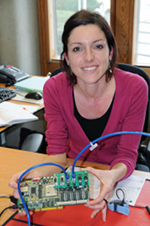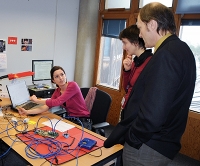An interview with Olivia Barcos, Young Graduate Trainee with ExoMars
 |
Olivia Barcos Young Graduate Trainee (2008-2010) |
|
Left: Olivia with the processing board of the digital Sun sensor prototype - one of the projects that she worked on as a YGT. Credit:ESA |
Olivia was born on 5 June 1981 in Huesca, Spain. Her curiosity about how satellite technology works was first stimulated 15 years later, during High School; this is where she was first inspired to study for a technical degree. Following a Masters degree in Telecommunications and Engineering at the University of Madrid opened Olivia's eyes to the possibility of working in the space sector. Her pursuit of this career path, and her desire to experience working abroad, led her to gain valuable work experience with ESA as a Young Graduate Trainee (YGT), working with the ExoMars Team at the European Space Research and Technology Centre (ESTEC), in the Netherlands.
Olivia, you are a Young Graduate Trainee at ESA, what does this mean?
The Young Graduate Trainee (YGT) programme is devised for people who have just graduated from their third-level studies and allows them to come to ESA for one year to experience working in an international, multicultural environment. I think the programme opens doors to the European space sector, providing a way for you to see a variety of different projects and get a clearer idea of what you want to do in the future. As a child my family moved several times, which included two years living in Indonesia and I spent a summer abroad learning English. Both experiences, I think, gave me a desire to find out what it would be like to work abroad. I applied for the ESA Young Graduate Trainee programme as it satisfied this personal aspiration as well as my professional interest in the space sector and specifically in the ExoMars project.
What have you worked on during your time at ESA?
While at ESTEC I worked with the payload team for ExoMars and I was really excited to work on this project here at ESTEC because I had already worked for a short period on an ExoMars instrument (Raman/LIBS), in my previous job. During my first year as a YGT I was working on a payload operations simulations tool which is a tool to analyse the resources of the instruments in the ExoMars Rover. This tool offers a quick and easy way to test the resources available during the Reference Surface Mission that will take place during the nominal lifetime of the ExoMars Rover.
|
Olivia demonstrates the Sun sensor prototype to Don McCoy, ESA's ExoMars Programme Manager, and Anne Pacros, Payload Engineer. Credit: ESA |
 |
I was lucky enough to have my traineeship extended by a year and during the second year I had the opportunity to work on something more technical and more hands-on; a prototype of a Sun sensor in SpaceWire communications. SpaceWire is a standard for high-speed links and networks onboard spacecraft. It includes both hardware and standard methods for packing and sending information. It is useful when faced with integrating hardware and software developed by teams from across Europe. In this project I felt I had the chance to experience real engineering work covering typical phases such as design and simulation.
Did you have any special opportunities during your time as a YGT?
During my first year, I had the opportunity to meet with a team at Thales Alenia Space in Italy who were developing a tool that was similar to the one I was working on. It was good to meet people from industry and to also talk to people who had encountered problems similar to those that I had whilst developing my tool. I found it extremely useful to learn from their experience. Also, during this visit I attended one of the ExoMars Progress Meetings, this was another great learning opportunity for me.
What do you feel you have gained from this experience, both professionally and personally?
Being a YGT was highly educational, both professionally - in terms of the project that I am working on - and personally. I have had the experience of working independently, in a team and with other departments within ESA. I also feel that I am providing useful input for the team and the project. I have been given the responsibility to get on with my project after being given some clear directions; this is very different to my previous job and has been a good learning experience. I have gained confidence in myself and my English has improved. These two years with the ExoMars team have also given me a clearer idea of what I want to do in my career.
European Space Research and Technology Centre, ESTEC. Credit: ESA |
ESTEC is an amazing place to work and I have had the opportunity to meet people from many different countries and cultures. It has been a wonderful experience working here, and I have had the chance to explore a new country. I have had a very enriching experience in and outside of work and I will be really sad to leave as I feel at home and have made so many new friends.
Your time as a YGT is coming to an end. Has it encouraged you to pursue a career in the space sector?
Yes it has, after coming here and seeing all the exciting possibilities, all the projects that ESA are leading, I feel more motivated than ever, I will continue for sure.
What aspect of the ExoMars programme is most appealing to you?
For me, the most attractive thing about this programme, apart from all the technological objectives it has, is having as its final goal the search for the possibility of life on Mars, for extra-terrestrial life!



